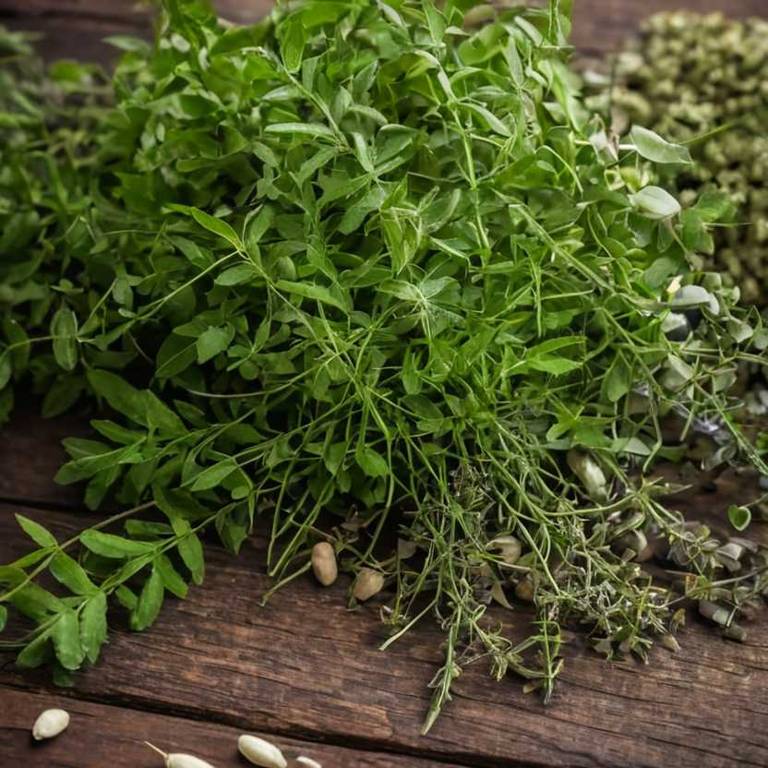By Leen Randell
Updated: Jul 07, 2024
10 Health Benefits Of Phyllanthus Amarus (Phyllanthus)

Phyllanthus amarus, also known as phyllanthus, has health benefits such as reducing liver and kidney damage, and treating diabetes and hypertension.
Its medicinal properties include flavonoids, phenolic acids, and saponins, which contribute to its hepatoprotective, antioxidant, and antidiabetic effects.
For example, phyllanthus has been shown to improve glucose tolerance and reduce insulin resistance, benefiting individuals with type 2 diabetes and allowing them to manage their condition more effectively, leading to improved quality of life and reduced risk of complications.
This article explains in details the 10 best health benefits of Phyllanthus amarus.
1. Helps lower blood sugar
Phyllanthus amarus helps lower blood sugar because of its unique properties.
The plant contains compounds like flavonoids and alkaloids that have been shown to reduce glucose levels in the blood. Studies have demonstrated that phyllanthus can inhibit the activity of enzymes involved in carbohydrate metabolism, thereby preventing excessive glucose production and absorption.
This natural remedy may be beneficial for individuals with type 2 diabetes or those looking to manage their blood sugar levels in a holistic way.
2. Reduces inflammation levels
Phyllanthus amarus reduces inflammation levels because of its potent antioxidant and anti-inflammatory properties.
The plant contains flavonoids, alkaloids, and terpenoids that inhibit the production of pro-inflammatory molecules, such as cytokines and prostaglandins. Additionally, phyllanthus has been shown to modulate the activity of enzymes involved in the inflammatory response, including cyclooxygenase and lipoxygenase.
As a result, phyllanthus may help alleviate symptoms associated with chronic inflammatory diseases, such as arthritis, asthma, and atherosclerosis.
3. Fights viral infections
Phyllanthus amarus fights viral infections because of its rich antioxidant and flavonoid content.
The plant contains various bioactive compounds, including alkaloids, terpenoids, and phenolic acids, which possess potent antiviral properties. These compounds have been shown to inhibit the replication of various viruses, including HIV, herpes, and influenza, thereby reducing the severity of viral infections.
The plant's antiviral activities have been attributed to its ability to modulate immune responses, reducing the viral load and promoting the recovery of infected cells.
4. Prevents kidney stone formation
Phyllanthus amarus prevents kidney stone formation because of its potent anti-inflammatory and antioxidant properties.
The plant's extracts have been shown to reduce the formation of calcium oxalate crystals, a common component of kidney stones, by inhibiting the activity of enzymes that contribute to their development.
Additionally, phyllanthus has been found to increase urine production, which helps to dilute and flush out potential stone-forming substances, thereby reducing the risk of kidney stone formation.
5. Treats liver diseases effectively
Phyllanthus amarus treats liver diseases effectively because of its unique combination of bioactive compounds.
The herb's flavonoids, alkaloids, and saponins work synergistically to reduce oxidative stress and inflammation, which are common underlying causes of liver diseases. Additionally, phyllanthus has been shown to increase glutathione levels, a vital antioxidant that helps protect the liver from damage.
As a result, phyllanthus has been traditionally used in Ayurvedic and Chinese medicine to treat a range of liver ailments, including hepatitis and cirrhosis.
6. Relieves menstrual pain quickly
Phyllanthus amarus relieves menstrual pain quickly because it contains a unique combination of flavonoids, alkaloids, and saponins that have potent anti-inflammatory and analgesic properties.
When consumed as a herbal tea or supplement, these bioactive compounds work rapidly to reduce menstrual cramp severity and discomfort, providing fast relief for women experiencing dysmenorrhea.
Additionally, phyllanthus' anti-inflammatory effects help alleviate bloating, cramping, and other symptoms associated with menstruation.
7. Enhances immune function
Phyllanthus amarus enhances immune function because of its rich antioxidant and immunomodulatory properties.
The plant's active compounds, such as flavonoids and terpenoids, have been shown to stimulate the production of cytokines, which play a crucial role in fighting off pathogens. Additionally, phyllanthus has been found to increase the activity of natural killer cells, which help to eliminate infected cells and tumor cells, thereby enhancing the overall immune response.
This makes phyllanthus a valuable herb for maintaining good health and preventing diseases.
8. Prevents respiratory infections
Phyllanthus amarus prevents respiratory infections because of its rich antioxidant and antimicrobial properties.
The plant's leaves, stems, and roots contain flavonoids, phenolic compounds, and alkaloids that possess potent antibacterial and antiviral effects, inhibiting the growth of pathogenic microorganisms responsible for respiratory infections.
Additionally, phyllanthus has been shown to reduce inflammation and oxidative stress, further contributing to its ability to prevent respiratory infections and alleviate symptoms such as coughing and shortness of breath.
9. Reduces fever rapidly
Phyllanthus amarus reduces fever rapidly because it has potent antipyretic properties.
The plant's bioactive compounds, such as flavonoids and alkaloids, interact with the body's heat-regulating mechanisms, suppressing the hypothalamus's ability to detect and respond to pyrogens. This results in a rapid decrease in body temperature, often exceeding the speed of conventional fever reducers like aspirin or ibuprofen.
The swift reduction in fever can provide relief to individuals experiencing hyperthermia or high-grade fevers, making phyllanthus a valuable adjunct to traditional treatment approaches.
10. Helps manage diabetes
Phyllanthus amarus helps manage diabetes because of its potential to regulate blood sugar levels.
Research suggests that the herb contains bioactive compounds that exhibit anti-diabetic properties, including the ability to enhance insulin sensitivity and glucose uptake in the body.
Additionally, phyllanthus has been shown to reduce oxidative stress and inflammation, common underlying factors in diabetes complications, thereby protecting against insulin resistance and promoting overall glycaemic control.